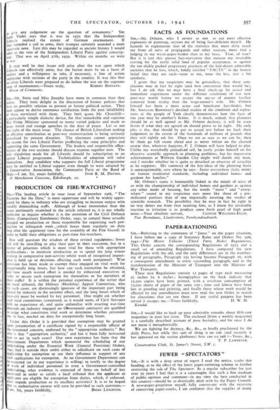PRODUCTION OR FIRE-WATCHING?
Sut,—The leading article in your issue of September 19th, " The— Factories Set the Date," is most opportune and will be widely appre- ciated by those in industry who are struggling to increase Output with steadily diminishing staffs. Although of lesser importance than the issues pertinently examined in the article referred to, it is not wholly irrelevant to inquire whether it is the intention of the Civil Defence Duties (Compulsory Enrolment) Order, 1941, to compel those actually engaged on production or those responsible for organising such pro- duction to relinquish work e(which keeps them regularly on duty long after the appointed time for the assembly of the Fire Guard) in order to fulfil their obligations as part-time fire-watchers.
Few will question the wisdom of these revised regulations; fewer still will be unwilling to play their part in their execution, but in a matter of priorities which is most vital for those with appropriate qualifications: to maintain production or to spend the long winter evening in comparative non-activity whilst work of recognised import- cc is held up or decisions affecting such work postponed? Wise provision has been made to exempt those engaged on vital work for exceptionally long hours, but how can such exemption be obtained, and how much wasted effort is needed by exhausted executives in order to secure such exemption for themselves or for members of their staffs? It is within the personal experience of the writer that the local tribunal, the Military (Hardship) Appeal Committee, who try such cases, are -distressingly ignorant of the important part being played by industry in the national effort, and the long hour's which of necessity must be worked by key personnel. One might ask whether such loeal committees (composed, as it would seem, of Civil Servants With no experience of, and quite unfamiliar with exacting war-time demands on industry engaged on (ttvernment contracts) are qualified to judge what constitutes vital work or determine whether personnel are, in fact, needed on duty for exceptionally long hours.
Under this Order it is provided that exemption may be granted uPen presentation of a certificate signed by a responsible official of the interested concern, endorsed by the "appropriate authority." But Who is that "appropriate authority," and has it been fully instructed how to act in such cases? Our own experience has been that the Government Department which sponsored the scheduling of our undertaking under the Essential Work (General Provision) Orders, 1941, feel it outside their ambit either to adjudicate on such cases of application for exemption or use Their influence in support of any such applications for exemption. As no Government Department can be expected (or in our experience is willing) to testify to the degree ef work of individual personnel in even a Government-controlled undertaking, what evidence is expected of firms on behalf of key Personnel_ in order to satisfy a local tribunal that the applicant or applicants are eligible for exemption from duties, which, if enforced, tat impede production or its ancillary activities? It is to be hoped t an authoritative answer will soon be provided to such questions.—


























 Previous page
Previous page